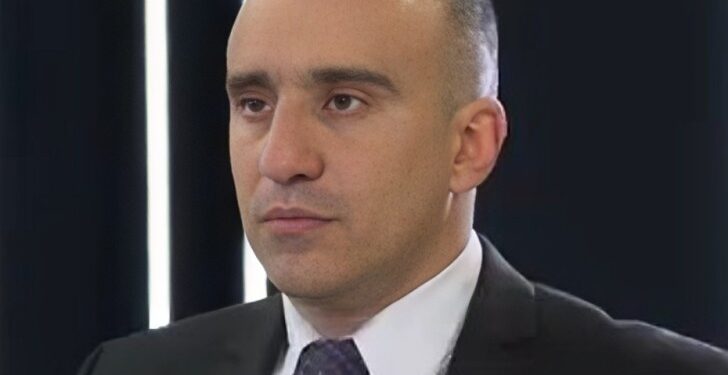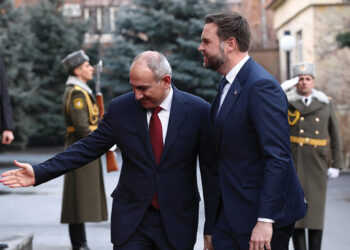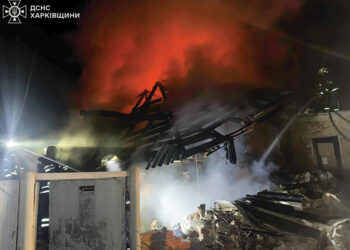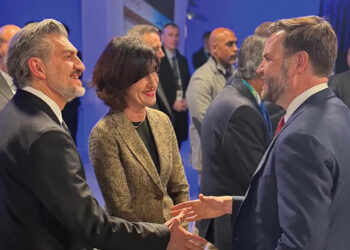Interview by Vazha Tavberidze
In this interview with RFE/RL’s Georgian Service, Robert Gevondyan, a political analyst and expert at the Research Center on Security Policy in Yerevan, explains why the old logic that once bound Armenia to Russia is collapsing — and how the Church, oligarchs, and Kremlin pressure all threaten Armenia’s fragile path toward Europe. With Georgia facing its own crossroads, Gevondyan warns: the cost of turning Westward is high — but the cost of staying put is even higher.
This chapter of Armenia’s long history unfolding before our eyes — what is it really about?
Armenia is now rethinking not only its foreign policy but its identity — how we see ourselves in the region and in the world. Over the past five years, especially since the 2020 war, many Armenians have realized that the principles we used to live by no longer reflect our real interests.
We assumed the world — at least until 2020 or maybe 2022 — was stable. Many believed the status quo in Karabakh would last forever. They never imagined a settlement; they thought nothing would ever change. Now there’s a painful awakening. It’s difficult for society and the government, because so many realities no longer fit the expectations we had before 2020.
Russia’s war in Ukraine made this even clearer. When Russia invaded and the West and others didn’t allow it to win, many here couldn’t understand it. To them, it made no sense. The logic was simple: Russia is strong, Ukraine is weak, so Russia should win. Why help the weak?
That same mindset shaped what happened in Karabakh. People thought: Azerbaijan got stronger, we got weaker — so of course Russia didn’t help us, because the strong prevail. In the 1990s, we were stronger, we got help, and we won. That logic has now collapsed — and for many, that’s deeply painful. They can’t understand why Ukraine is getting help.
There seem to be two visions now for what Armenia should be and where it should be heading in the modern world. Can you describe these two worldviews for us?
The divide runs through society. One part — the majority — wants to live in a democracy, choose its own leaders, and make its own decisions. The other part — maybe a third of the population — wants others to decide for them, because that’s how they’ve always lived. These people don’t care whether it’s a democracy or autocracy. Some even say, “Bring back Stalin,” with all the repression and dictatorship, as long as they don’t have to make decisions. They just want to live quietly, with someone else in charge.
This internal divide feeds into today’s political battles between the government and the opposition. It really flared up around February this year when presidents began making moves. First, the second president gave an interview, then Pashinyan responded, and then the third president weighed in. Even Levon Ter-Petrosyan joined the fray with his own criticism.
At first, it seemed like early pre-election bickering. But in May, something more serious happened: the United States offered a plan to Armenia and Azerbaijan to open regional communications, including settling the Zangezur Corridor issue. Moscow understood that if this American-backed plan moved forward and regional links were opened under it, Russia would lose leverage. That’s not in Russia’s interest. So they had to act — by trying to influence either Armenia or Azerbaijan to block the process. And Armenia, of course, is the easier target.
Russia has many levers it can pull in Armenia. If they all get used, Armenia’s defenses won’t hold. Ideally, Moscow wants a change in government — someone who would abandon cooperation with the U.S. and align fully with Russia. How would they make that happen? By creating chaos, then using that chaos to bring in figures who could never win elections under normal circumstances.
That’s where oligarch Samvel Karapetyan comes in. He was sent to Armenia much like Bidzina Ivanishvili was sent to Georgia. But Ivanishvili had time — Karapetyan doesn’t. Ivanishvili won elections and spent ten years pretending to pursue Euro-integration, only to shift gears in the last two or three years and begin passing laws Moscow wanted. If Karapetyan comes to power, he’ll have to reject everyone but Moscow from day one.
Where does the Armenian Church fit into this? Is the clash between the Prime Minister and the Church also a result of Russian meddling?
That’s a mistake made by Pashinyan’s government back in 2018. After the revolution, there was talk about replacing the Catholicos, but they didn’t act on it. They said: the Constitution doesn’t allow interference, so they left the Church alone. That was their approach in general — if they removed a minister, they just promoted the deputy.
But in 2018, they had far more options. If they had wanted to replace the Catholicos, they could have. The same applies to the Constitutional Court — they failed to act, and by 2020, the old regime had regrouped.
Now, the Church supports the camp that favors a Russia-aligned Armenia, not the democratic one. The Church is conservative, and many of its members belong to that second, more authoritarian-leaning camp. Under the old governments, senior bishops had more political influence, which they lost after 2018. They want back into politics — and for that, they need the old regime back.
So is the Church indirectly or directly a pillar of Russian influence?
Directly. The Catholicos’s brother leads the Armenian Apostolic Diocese in Russia. The Church is somewhat constrained in how openly it can interfere, but it still gets involved.
Do you think this standoff will end with victory for one side or the other — or will there be a compromise? And if Pashinyan does win, how much will it cost him politically?
A month ago, I would have said the Church still had a chance to step back peacefully. All they needed to do was remove Bishop Bagrat Galstanyan, who had openly entered politics and become a key opposition figure. Once he became a political leader, he should no longer have served as a clergyman.
They also should have silenced bishops who publicly declared things like “democracy is the worst thing for Armenia,” or called for a return to Stalinist rule, or even said Armenia should become a theocracy like Iran. A month ago, if they had taken those steps, I believe Pashinyan might have dropped the Church issue entirely. The Church could have gone back to focusing on religion, and the state on governance.
But instead, they doubled down. Here’s the key point: the opposition latches onto every possible issue. War? — the government is handling it wrong. Covid? — again, wrong. Now the Church. Their noise, their pressure, their reach pushed the Church to escalate.
Without that, the Church might have backed down. But opposition voices started yelling: “Pashinyan wants to destroy the Church, Pashinyan is Satan, the Church is sacred,” and created a situation where the Catholicos and bishops had no room to maneuver.
Georgia’s former president Saakashvili recently said, “Pashinyan is doing now what I failed to do with Bidzina back then.” Do you agree with that parallel?
Not exactly. Pashinyan didn’t do what Saakashvili did. When Saakashvili came to power, he removed corrupt officials. Pashinyan tackled corruption but left many of the corrupt in place.
So if the old system returns, those same people will go back to taking bribes.
When Ivanishvili came to power in Georgia, Saakashvili likely thought the country was already built — that any successor would have to play by the new rules. And for a while, Ivanishvili did. He played by the rules for about ten years, before gradually rewriting them.
Pashinyan knows he didn’t create such a system. That’s why it’s fragile — it can be flipped overnight. If Samvel Karapetyan takes power, the system will be reversed in a single day.
Saakashvili didn’t need to block Ivanishvili, because the rules, the institutions, the system, all gave him room to maneuver. Pashinyan has no such cushion.
How intertwined are Georgia and Armenia’s futures now? Does what happens in Tbilisi affect Yerevan, and vice versa?
From Armenia’s perspective, Georgia is our ally and strategic partner, regardless of who’s in power or what direction they take. Ideally, we’d move forward together. If Georgia heads in the same direction Armenia is trying to go — toward Europe — that’s the best-case scenario.
Unfortunately, the current Georgian government has chosen a different path. That has two consequences from a Realpolitik standpoint. First, it makes it much harder for Armenia to access Europe if Georgia becomes pro-Russian. Second — paradoxically — it might make it easier for Armenia to work directly with the West, bypassing Georgia entirely, because you can no longer rely on Georgia to act as a regional conduit.
On Armenia’s place in the region, Mr. Zatulin (first deputy chairman of the committee of the State Duma for the CIS) described Karabakh as “a brick in Russia’s pyramid in the South Caucasus,” and once it got removed, “the whole structure collapsed.” Is Russia trying rebuilding that pyramid?
The old security system in this region did collapse, yes. Russia now is trying not to let its influence disappear completely, but it has shrunk significantly, especially in Armenia. It has also shrunk, though less so, in Azerbaijan. Russia is trying to stop this decline from crossing a red line.
If Armenia and Azerbaijan strike a deal, and the US gets a real role here, Russia won’t be able to hold any red lines. Of course, as long as Russia exists, it will have a presence in the region. The question is whether it still has a voice in decisions. Will its voice matter? Will its opinion count when deals are made? One by one, Russia can lose these steps. It might still lash out here — but decide nothing.
You said Russia has levers, and if it pulls them all, Armenia could “cease to exist.” One lever is military. Russia has a military base in Armenia. Georgia’s ruling party has long used the scaremongering narrative of “If we go, Russia will invade”. Why aren’t you afraid they’ll invade you?
Of course we’re afraid. There’s always that threat. But unlike Georgia or Azerbaijan, we have one advantage: we don’t share a border with Russia. The 102nd base is a threat only if the pro-Russian camp grows bigger. As long as it’s small, the base can fire at people, but each shot just grows the other camp in numbers, because they’d be shooting Armenians. People would just rise up and get rid of the 102nd base. Armenia has way more capacity than that base alone. Any Russian defense of that base would mean a war between Armenia and Russia. The chance of that is very small, because there’s no sense in fighting Armenia while they’re still stuck in Ukraine.
And if, after Ukraine, they want a “quick, victorious war” to reassert themselves?
If Russia wins in Ukraine, then Armenia, Georgia, and Azerbaijan will no longer be able to maintain independence. Full stop. That’s the nightmare scenario.
If, on the other hand, Russia doesn’t win — if the war is simply frozen — then maybe there’s room for maneuver. And if Russia loses decisively, like Iraq lost to Iran, then Armenia, Georgia, and Azerbaijan will all need outside support. Without that, none of us can hold Russia off alone.
Despite that threat, is the government determined to stay on its pro-Western path?
Yes. Right now, we’re trying to move toward the environment where we truly belong, civilizationally. We — like Georgia — are part of European civilization.
Yes, geographically, we’re part of the Middle East — just look at a map. But there’s a difference between geography and mentality. Mentally, culturally, and historically, Armenia and Georgia have always belonged to Europe.
That goes back to ancient times. So this westward path is not just political — it’s civilizational. Armenia is not part of “Eurasia,” at least not in the way people like Aleksandr Dugin define it — as a Russian-Turkish sphere.
For us, and for Georgia, there’s nothing in a Russian-Turkish Eurasian alliance. We belong to Europe. That doesn’t change with threats or regime changes. Even if the old regime returns and Armenia again becomes a Russian outpost, as it was before 2018, the people will still lean toward Europe.
Any thinking person wants to belong where they feel at home — and for Armenians, Europe is home.
But you said if Russia tries to come back, Armenia needs outside support. How confident are you that the West will have the will, the time — the spine — to give that support?
You can never be 100% confident. That’s just the reality of international politics — your interests align today, but maybe not tomorrow.
That’s why I say our government must go as far as possible, right now, to break free from Russian influence. So far, they’ve nationalized the electric grid, because they could. I believe the next step will be nationalizing the South Caucasus Railway, which is still controlled by Russia.
Russia has failed to meet its obligations there. It’s failed to deliver on everything it promised.
Does the recent flare-up of tensions between Moscow and Baku help push Russia out of the region?
Not really. Russia and Azerbaijan cannot afford to become full-blown enemies. If they did, Russia would lose its ability to keep the war in Ukraine going.
Azerbaijan helps Russia export its energy. In 2022, Azerbaijani oil and gas exports rose sixfold — but everyone knows that was Russian oil and gas moving through Azerbaijan.
What we’re seeing now between Baku and Moscow is a recalibration — not a rupture. Russia has leverage over Azerbaijan, and Azerbaijan has leverage over Russia.
The only question is where the new boundary lies. Right now, they’re renegotiating it. Baku wants more autonomy. Moscow wants to be factored in. That boundary won’t shrink to zero — that’s impossible. But it is shifting.
President Trump and earlier Secretary Rubio said Azerbaijan and Armenia are close to a US-brokered peace deal. Do you share that optimism — and what would it mean for the Zangezur Corridor?
Signing a peace treaty doesn’t automatically mean anything gets resolved in Zangezur. The US proposal is interesting for both Yerevan and Baku. The second Baku says “we’re signing,” Armenia will sign too. The problem is Azerbaijan. What does Baku need to sign? It needs to see what it gets out of it. That benefit doesn’t come from Armenia, because they already took everything they wanted from us. Stuff like rewriting the constitution or the Minsk Group dissolving — none of that is serious. These are just pretexts for Aliyev to see if he can get more from other centers of power.
This might include the Zangezur Corridor, but there are other things too. First, the succession issue — everyone knows Aliyev wants his son to succeed him as president. That has to be legitimized. Second, Aliyev needs money to rebuild Karabakh to lock it in as Azerbaijani territory. He needs investors, but none are coming. Whether he admits it or not, Aliyev still fears an Armenian comeback. If the US or someone else signs an investment deal for Karabakh, that might be enough motivation for Baku to keep the Zangezur dispute ongoing — but still sign the treaty now. The Zangezur Corridor and peace deal are not directly tied. There are plenty of other incentives beyond Zangezur — and some might be enough to leave it aside for now.
If this treaty is signed, will it last a decade?
I think it’ll hold. If the treaty is signed, it’ll push forward other things — demarcation, delimitation, opening up transport routes. That’s the positive side. But there’s a downside too: Azerbaijan will use the treaty, along with other tools, to pressure Armenia — they’ll say Armenia’s violating this, violating that. Maybe sometimes we will violate something — I won’t claim we’re saints. But Baku will definitely say it. Still, better to have a treaty that gets violated — that’s normal for countries with a conflict-heavy past.














